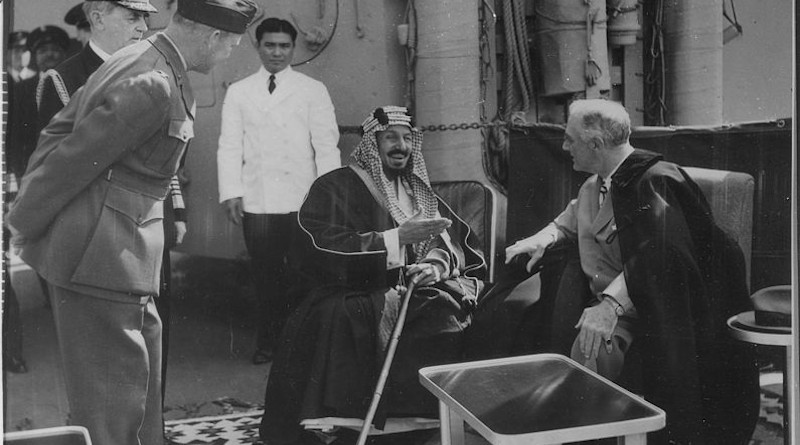Valentine’s 1945: Day A Historic Relationship Began – OpEd
By Arab News
By Salman Al-Ansari*
Valentine’s Day of 1945 marked a turning point in relations between Saudi Arabia and the US, establishing the beginning of one of the most important and strategic government-to-government and people-to-people relationships, with exchanges that have provided for achieving shared values, goals and interests.
On this day, Saudi King Abdul Aziz ibn Saud accompanied US President Franklin D. Roosevelt aboard American cruiser USS Quincy in the Suez Canal — following the victory by US and allied nations in World War II — for the purposes of exchanges in physical security and energy development from oil resources. This historic meeting established a post-world-war alliance that has flourished into the modern era, with the continuous advancement of the shared goals of regional security, energy stability, economic development and more that encompass all collaborative exchanges between the two countries.
Like the revolutionary King Abdul Aziz ibn Saud, the warrior who established the modern Kingdom of Saudi Arabia through endless battles with leadership and strength, the US-Saudi relationship too has been revolutionary in similar ways, including sharing and prevailing in power and leadership on the global stage, and achieving together in opportunities, challenges and battles through enactments of domestic and international policies. By understanding cooperation between the US and Saudi Arabia, one can determine how similar in nature the Saudi and US governments and their societies are, which can explain how this relationship has prospered and should continue to benefit both with mutual understanding and actions considering their shared interests and goals.
Broad cooperation ranges from economic developments, educational exchanges, energy security and market stability, the continuous fight against radical extremism, countering theats and acts of terrorism, maintaining legitimacy in the Middle East order, and all other aspects that encompass one of the most important relationships in the world.
Cooperation in advancing goals in domestic and international policies has created an alliance that continuously protects shared interests, advancing economic and social developments while deterring adversarial influence that threatens US-Saudi national security.
Arguably, the biggest influence threatening US-Saudi relations to date is Iran, with its malign terrorist network actively undermining international law and all that encompasses the legitimacy of a recognized civilized nation. Since the Islamic Republic of Iran rose to power in 1979, its ideological espousation and use of hard power for religious extremist political gains has shocked the world. Its malign influence, clerical control and oppressive actions in domestic and international affairs have threatened the moral and social fabric, legal legitimacy and regional stability of all international societies.
Iran’s influence has arguably led to the rise — and gives illegitimate support to — the grievances of most modern terrorists today, especially in Yemen, Syria, Iraq, Lebanon, Palestine, Libya and elsewhere, threatening international security. By acting pragmatically in opposition to Iran and its partners’ malign enactments, the US-Saudi front seems to always find the higher ground, influenced by logical reason, unlike Iran and similar actors, who play into ideological grievances influencing terrorism, causing further destablization in the Middle East and around the world.
With aims to deter such influence while maintaining strong and prosperous US-Saudi relations, it is important to remember shared history, to act pragmatically and logically, reform policies for international legal legitimacy, and continue in developments involving economic and social exchanges that encompass the uniquely shared relationship between the governments and peoples of the US and Saudi Arabia. Both have risen to power as an alliance on the global stage, coming from a place with a desire for economic and social prosperity, with an understanding of reasoning for ideological and social reform domestically and internationally.
With an alliance dedicated to social and economic security and prosperity within their societies, advancing both is arguably essential for the US-Saudi Arabia relationship to flourish in the international realm while maintaining the status quo as top world powers. For this alliance’s influence to continue to prosper in the form it is today, both must maintain a policy to deter Iran’s malign activity and pursuit of nuclear weapons, counter other forms of radical extremism and terrorism, maintain legitimacy in domestic and international legal realms, ensure economic security away from oil dependency, and continuously develop the social realm to meet future challenges and opportunities in US-Saudi relations.
- Salman Al-Ansari is the founder and president of the Saudi American Public Relation Affairs Committee (SAPRAC). Twitter: @Salansar1

